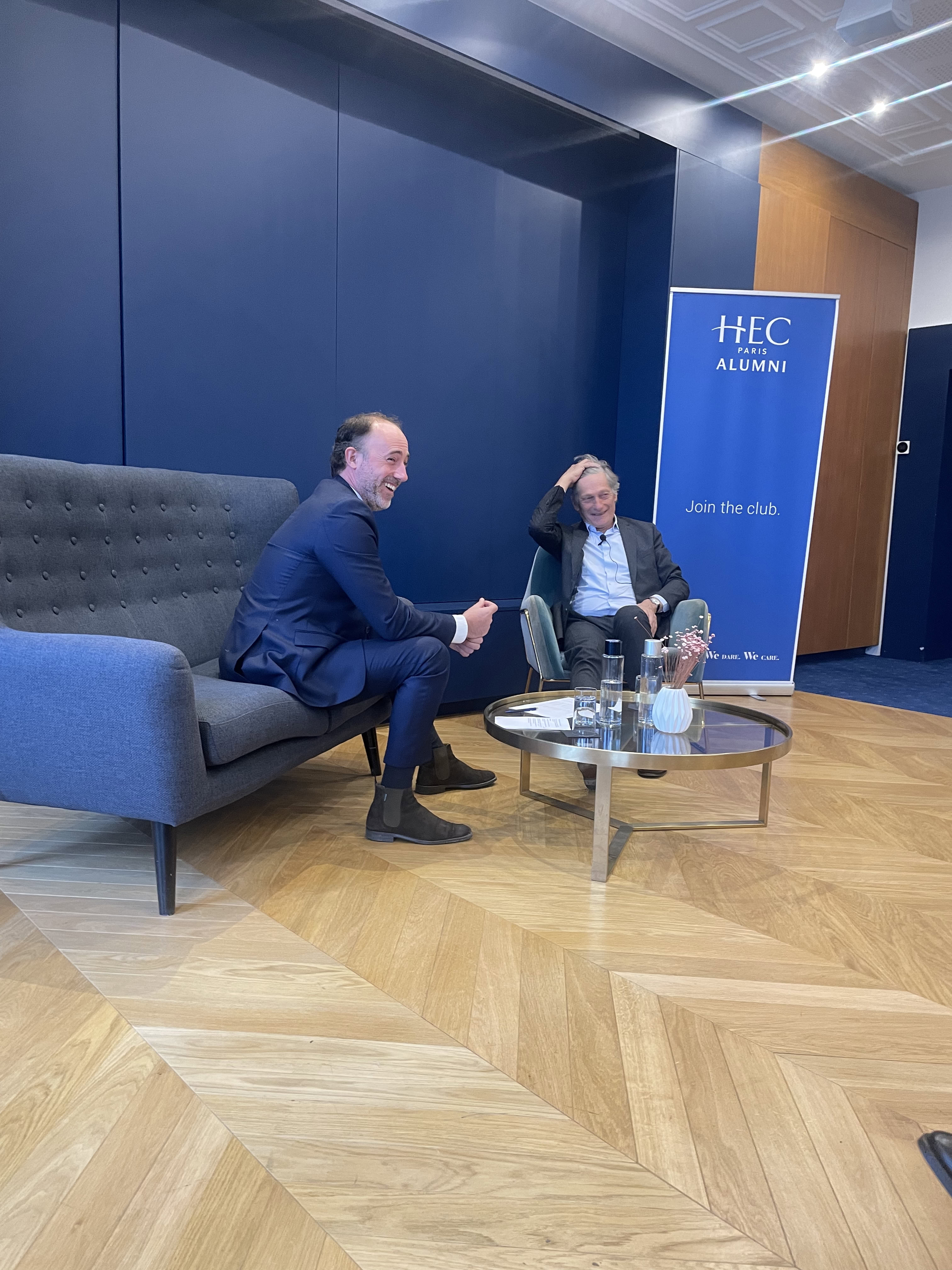Nicolas de Tavernost: “French football must become a league of ambition again”

The HEC Alumni offices on Avenue Franklin-Roosevelt in Paris hosted a special event on Monday, November 3, organized by the HEC Sport Business Club. A full room of members welcomed Nicolas de Tavernost, Chief Executive Officer of LFP Media, the organization responsible for the commercial development of French professional football. His appointment comes after several years of instability around the broadcasting rights of Ligue 1, the French top division, whose value has declined and put pressure on the league’s economic model. In a context where football has become a global cultural product, the French ecosystem needed to restore stability.
Sport Business Club Event / interview by Mathieu Besson (E.23)
Nicolas de Tavernost spent most of his career at the M6 Group, which he chaired for nearly 25 years. He oversaw the channel’s development, its stock market listing, the diversification of its activities, and its transition into the digital era. M6 was also the majority shareholder of the Bordeaux Girondins football club, where he played a central role in strategic direction. This period included two French championship titles (1999 and 2009) and qualification for European competitions in two out of every three seasons. An experience that has given him deep insight into the economic and social realities of the sport. He joined LFP Media in May 2025 to lead its transformation. A move that reflects a symbolic convergence of two worlds, media and sport, where economic, cultural, and governance issues intersect.
“French football must become a league of ambition again. That means having a clear strategy and shared ambition,” he stated at the outset, setting the tone for a forward-thinking and clear-eyed discussion.
Restoring value for the clubs
When he arrived at LFP Media, the main broadcaster – DAZN – challenged its contract and suspended payments. In the French football economy, largely dependent on broadcasting revenues, this immediately threatened the financial stability of clubs.
“The first priority was to secure funding for the clubs,” he explains. “Without that foundation, no project is sustainable.”
The second priority is to restore value to Ligue 1, not only as a sports competition, but as a cultural asset. A league draws attention only if people understand what it stands for: the cities it connects, the identities it embodies, and the stories carried across stadiums, screens, and everyday conversations.
“French football does not lack stories. What matters is how we tell them.”
While the English Premier League and Spain’s La Liga have become global brands, Ligue 1 must reassert its visibility, narrative coherence, and place in the collective imagination, both in France and internationally.
Ligue 1+: reclaiming distribution and audience connection
It is in this context that Ligue 1+ was launched last August, a platform that now broadcasts live and exclusively 8 of 9 matches per matchday.. Its launch was executed under tight time constraints, driven less by technological ambition than by the need to maintain visibility and continuity. The platform not only ensures competition coverage but also restores control over the relationship with fans.
“In less than two months, we were close to reaching the first-year subscription target,” notes Nicolas de Tavernost. By late September, the platform had surpassed one million subscribers and is approaching the season-end target of 1.15 million.
The strategy is based on one principle: hyperdistribution. The goal is not to force audiences onto a single platform, but to ensure the league is available wherever fans already are: on connected TVs, set-top boxes, telecom operators, videogame devices, OTT platforms, and soon perhaps more, as shown by the recent distribution partnership with French leading sport publisher L’Équipe. A network-based approach rather than a closed ecosystem.
“We cannot ask audiences to change their habits. It is up to us to meet them where they are,” he summarizes. Value is not created by scarcity, but by accessibility, clarity, and seamless subscription journeys.
This approach also enables a unified understanding of fan behavior: how they watch, which clubs they follow, which moments generate attention. Behind hyperdistribution lies a deeper ambition: to rebuild a direct relationship with supporters and restore their central role in football’s economy. Digital is not presented as disruption, but as a means to reconnect the league with its communities, both local and global.
This is not a sudden overhaul, but a structured reconstruction: first stabilizing the economic model, then elevating Ligue 1 by reaffirming what makes it distinctive.
HEC Sport Business Club as a catalyst for ideas
The event highlighted the dynamism of the HEC Sport Business Club, chaired by Ghassan Attié (H.07) and Yann Baffalio (H.03). The club has become a key forum for dialogue among leaders in sport, media, and business, fostering high-level discussions and strategic thinking on the sector’s ongoing transformations.
Audience questions extended the conversation to governance, the balance between sport and business, and the impact of new technologies. In closing, Nicolas de Tavernost emphasized unity and confidence:
“French football has all the assets to succeed. It is up to us to turn them into collective strength.”
An inspiring morning, reflecting the qualities of its guest: clear-minded, demanding, and deeply committed to the future of French sport.
Published by La rédaction

